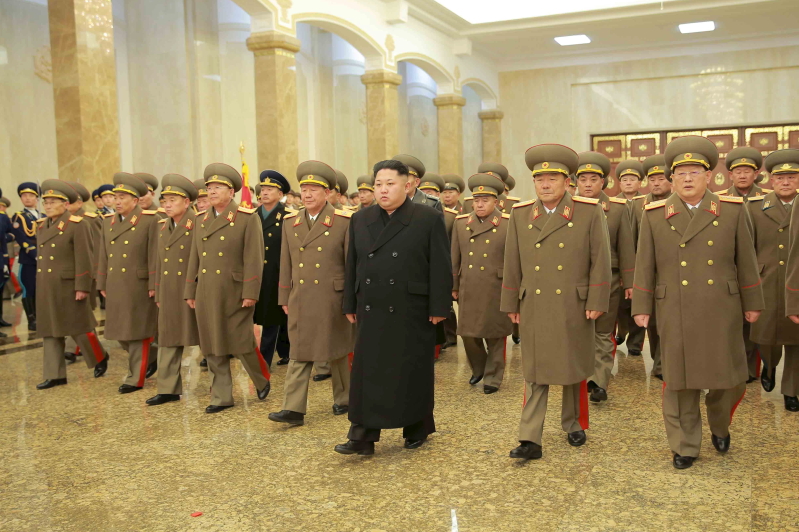
South Korea unleashed a high-decibel propaganda barrage across its border with North Korea on Friday in retaliation for its nuclear test, while the United States called on China to end "business as usual" with its ally.
The broadcasts, in rolling bursts from walls of loudspeakers at 11 locations along the heavily militarized border, blared rhetoric critical of the Pyongyang regime as well as "K-pop" music, ratcheting up tension between the rival Koreas.
North Korea later responded with its own broadcasts.
South Korea, which has grown increasingly close to China in recent years, also said its foreign minister would speak with his Chinese counterpart later on Friday.
Wednesday's nuclear test angered both the United States and China, which was not given prior notice, although the U.S. government and weapons experts doubt Pyongyang's claim that the device it set off was a hydrogen bomb.
China is North Korea's main economic and diplomatic backer, although relations between the Cold War allies have cooled in recent years.
China's Foreign Ministry urged North Korea to stick to its denuclearization pledges and avoid action that would make the situation worse, but also said China did not hold the key to resolving the North Korean nuclear issue.
"Achieving denuclearization of the Korean Peninsula and safeguarding the peninsula's peace and stability accords with all parties' mutual interests, is the responsibility of all parties, and requires all parties to put forth efforts," ministry spokeswoman Hua Chunying told a news briefing.
The North agreed to end its nuclear program in international negotiations in 2005 but later walked away from the deal.
U.S. Secretary of State John Kerry said on Thursday he had made clear in a phone call with Chinese Foreign Minister Wang Yi that China's approach to North Korea had not succeeded.
"China had a particular approach that it wanted to make, that we agreed and respected to give them space to implement that," Kerry told reporters. "Today, in my conversation with the Chinese, I made it very clear that has not worked and we cannot continue business as usual."
South Korea's nuclear safety agency said it found a miniscule amount of xenon gas in a sample from off its east coast, which could be the first chemical evidence of a nuclear test, but said more analysis and samples were needed to determine if it came from a nuclear test.
The presence of xenon would not indicate whether the blast was from a hydrogen device or not.
Seismic waves created by the blast were almost identical to those generated in North Korea's last nuclear test in 2013, Jeffrey Park, a seismologist at Yale University, wrote in a post on the Bulletin of the Atomic Scientists website, adding to scepticism about the hydrogen bomb claim.
TROOPS DEPLOYED, TOURS CANCELED
The South Korean broadcasts are considered an insult by the isolated North which has in the past threatened military strikes to stop them.
The last time South Korea deployed the loudspeakers, in retaliation for a landmine blast in August that wounded two South Korean soldiers, it led to an armed standoff and exchange of artillery fire.
The sound from the speakers can carry for 10 km (6 miles) into North Korea during the day and more than twice that at night, the South's Yonhap news agency reported.
A male announcer could be heard from South Korea telling North Koreans that Kim Jong Un, the leader of their impoverished country, and his wife wear clothes costing thousands of dollars. Another message said Kim's policy to boost both the economy and its nuclear program was unrealistic.
The North broadcasts were not clearly audible from the South and appeared intended to drown out those from the South, Yonhap said, citing a South Korean official.
North Korea boosted troop deployments in front-line units on Friday, and South Korea raised its military readiness to the highest level at locations near the loudspeakers.
The South vowed to retaliate against any attack on the equipment, raised its cyber security alert and canceled tours of the Demilitarized Zone on the border.
U.S. Republicans and Democrats in the House of Representatives could join forces in a rare display of unity to tighten sanctions on North Korea.
Nancy Pelosi, the House Democratic leader, told reporters that Democrats would support a North Korea bill likely to be brought for a vote by Republicans next week. A congressional source said it was expected as soon as Monday.
It was unclear how more sanctions would deter North Korea, which has conducted four nuclear tests since 2006.
The United States and South Korea are limited in their military response. Washington sent a pair of nuclear-capable B-2 stealth bombers over South Korea in a show of force after North Korea last tested a nuclear device in 2013.
North Korea responded then by threatening a nuclear strike on the United States.
A South Korean military official said Seoul and Washington had discussed the deployment of U.S. strategic weapons on the Korean peninsula, but declined to give details. Media said the assets could include B-2 and B-52 bombers, and a nuclear-powered submarine.






